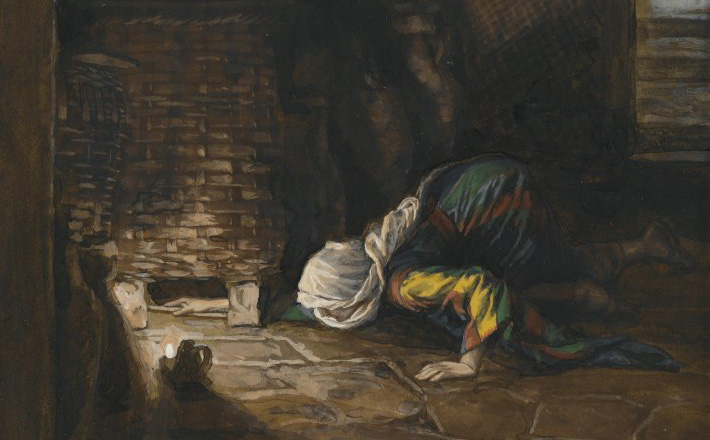Commentary on Jeremiah 4:11-12, 22-28
The preacher who chooses to preach this passage has no easy task. Walter Brueggemann calls it a “dangerous poem,” and rightly so.1
It portrays a people without sense and a world without order, overcome by human evil and the anger of God. But if we hold at arms’ length its powerful vision of de-creation, we will not hear the prophet’s testimony to the forces of death and destruction at work in our midst even today.
The poetry of Jeremiah 4:11-12, 23-28 echoes another of Scripture’s great poems, one that is far better known: the creation story of Genesis 1. Tracing the parallels between the two passages will help us better understand how the shared imagery functions in Jeremiah 4.
The strongest clue, impossible to miss, is the phrase “waste and void” (Jeremiah 4:23 NRSV). The identical phrase in Hebrew, tohu vabohu, occurs only one other place in Scripture, in Genesis 1:2, where NRSV translates it “formless void.”
Recall the beginning of Genesis:
“In the beginning when God created the heavens and the earth, the earth was a formless void and darkness covered the face of the deep, while a wind from God swept over the face of the waters” (Genesis 1:1-2 NRSV).
The verbal echo “waste and void” is a clue to the reader that the entire poem should be read with the creation story in view. The reader then begins to discern other echoes, beginning with the “wind” in Jeremiah 4:11-12. The “wind” (also “breath” or “spirit,” in Hebrew ruach) in Genesis 1:2 is a spirit of creation, hovering, stirring, blowing upon the formless void, animating and energizing in preparation for God’s work of dividing, ordering, and blessing. The wind in Jeremiah 4:11-12 is a clear and dazzling wind of judgment that scorches the heights of the earth and bears God’s words of indictment against God’s people. Throughout Genesis 1, divine speech initiates the process of creation, summoning into being first light (1:3), then the firmament (1:6-7), the seas and the earth (1:9-10), vegetation (1:11-12), sun, moon, and stars (1:14-16), creatures of sea, sky, and land (1:20-25), and humankind (1:26-27). In Jeremiah 4:11-12, however, the same verb dbr denotes speech, including divine speech, which will initiate not creation, but destructive judgment.
Further parallels and contrasts appear in Jeremiah 4:23-26. These verses imitate the repetitive and rhythmic style of Genesis 1 while simultaneously echoing its theologically rich use of the verb “to see” (Hebrew r’h). In Genesis 1, God speaks, creates, and sees. Six times, God saw what God ordered, created, and brought forth, “that it was good” (1:4, 10, 12, 18, 21, 25). When God’s work of creation was complete, “God saw all that God had made, and see (vehinneh)! It was very good” (1:31, author’s translation). Seeing enables God to assess the state of creation.
In Jeremiah 4:23-26, each verse has a shared structural pattern. The prophet reports, “I saw … ,” and then, by interjecting the particle vehinneh, “and see!” invites the reader to behold and assess the world as the prophet now sees it.
In the first instance, the prophet sees the earth and the heavens. This pairing echoes Genesis 1:1, where, through a literary device known as merism, earth and heavens designate the whole of the cosmos. But when the prophet beholds the earth (which may also be translated “the land,” a double meaning allowing the poet-prophet simultaneously to name the entire planet and the land of Judah), what the prophet sees is not its goodness, but instead “waste and void.” When the prophet looks to the heavens, the prophet sees that they have no light — not sun, not moon, not stars (Jeremiah 4:24). Creation has been unmade. The order of the cosmos has reverted to its primordial state, before God spoke to fashion a world from the waste and shine light into the darkness.
Jeremiah next beholds the mountains and high places, and invites the reader to witness how they quake and shake upon their foundations (Jeremiah 4:24). The description of the back and forth movement of these formidable land-masses echoes not Genesis, but such poems as the Song of Deborah in Judges 5 (Judges 5:4) and David’s song of Thanksgiving in 2 Samuel 22 and Psalm 18 (2 Samuel 22:8; Psalm 18:8; see also Psalms 60:4, 68:9, 77:19). In each case, such quaking is the earth’s response to God’s procession into battle. The peaceful ordering of creation by divine speech is now replaced and undone amidst seismic tumult, as the majestic heights tremble before the militant rage of God.
In the next verse Jeremiah tells us what he did not see: “I looked, and see! There was no human” (Jeremiah 4:25, author’s translation). The ’adam, made in God’s image on the sixth day of creation (Genesis 1:26-27), is not to be found. So too the creatures of the sky have vanished: the very birds God created (Genesis 1:20-21) and of which God granted custody to humankind (1:26, 28) have fled.
A fourth time Jeremiah looks and again bids the reader to see what he sees: the lush hillsides, once green with vegetation, are now a desert wilderness. The cities, places of human habitation, commerce, governance, education, and achievement, have been pulled down (Jeremiah 4:26). With each successive verse, another aspect of God’s good creation is unmade: the order of the cosmos; the separation between light and darkness, day and night; the stability of the earth; vegetation; animals; human life and livelihood. The proximate cause is divine anger (4:26), but God’s anger has arisen in response to human evil (4:22).
This is a difficult passage to preach indeed. On one side is a temptation to smooth over its searing vision and minimize its harsh critique. On another side is a temptation to villainize and moralize, stoking a pseudo-apocalyptic furor that blames disaster upon its victims. I see a key, a middle way, in Jeremiah’s fourfold repetition of the verb “I saw” and the particle “see!” The passage challenges preacher and congregation alike to see what we do not wish to see. We are challenged to behold the evil we wreak and to see the desolation of our mountains, our skies, our wildlife, our once-green spaces, our cities, and our human beings. If we have difficulty imagining that something is wrong, Jeremiah asks us to look again, more closely and more critically. We are called to sit in heaven’s darkness and hear the weeping of the earth (Jeremiah 4:28). If we are willing to forsake our stubborn foolishness, we might comprehend how we have betrayed our divine commission to be custodians of God’s creation, and humbly ask God and one another how to do good in the sight of God (4:22).
Notes:
1 Walter Brueggemann, A Commentary on Jeremiah: Exile and Homecoming (Grand Rapids: Eerdmans, 1998), p. 61.


September 11, 2016